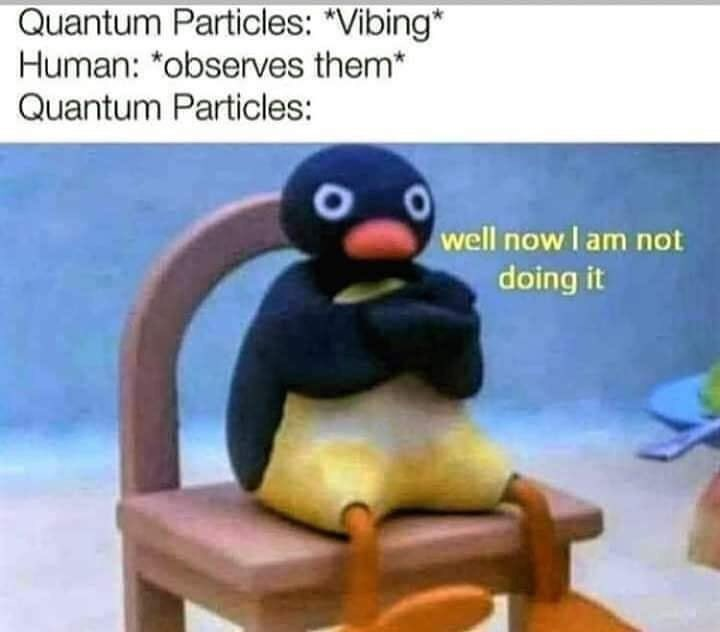Quantum mechanics: Difference between revisions
Fractalguy (talk | contribs) (Created page with "[https://en.wikipedia.org/wiki/Quantum_mechanics Quantum Mechanics] is not well understood, even by those who fully understand it. If it was truly understood, the [https://en....") |
Fractalguy (talk | contribs) |
||
| (37 intermediate revisions by the same user not shown) | |||
| Line 1: | Line 1: | ||
[ | [[File:Quantum-mechanics-fractal-mandala.jpg|thumb|This looks pretty quantum]]When it comes to [[spiritual]] matters, as well as discussions of [[consciousness]], quantum mechanics is a [[wikipedia:Red_herring|red herring]], and most writing on these subjects simply amount to [[quantum woo]].<blockquote>''"If you think you understand quantum mechanics, you don't understand quantum mechanics."'' -[[wikipedia:Richard_Feynman|Richard Feynman]] [https://www.nature.com/articles/d41586-025-00296-9]</blockquote>Quantum mechanics is fun to think about, and the [[wikipedia:Many-worlds_interpretation|many-worlds interpretation]] makes a great [[science]] fiction premise, but in [[reality]] quantum mechanics does not actually have anything to do with [[consciousness]], the [[afterlife]], alternate [[Universe|universes]], [[time]] travel, or anything that has any real impact on our [[life choices]]. | ||
If you are not a professional physicist, you almost certainly should not be sharing your personal theories on quantum mechanics with anyone. You don't understand it, and you don't need to understand it. Everything that impacts your [[life]] is on a [[wikipedia:Classical_mechanics|Newtonian scale]]. | |||
The following musings are offered only to highlight the metaphysical unimportance of quantum mechanics, not to support any particular interpretation thereof. | |||
== Quantum Mechanics Could Just Be Incomplete == | |||
As such, [[metaculture]] will not lean on the crutch of | [https://en.wikipedia.org/wiki/Quantum_mechanics Quantum Mechanics] is not well understood, even by those who fully understand it. If it was truly understood, the [https://en.wikipedia.org/wiki/Uncertainty_principle uncertainty principle] would be irrelevant and we would know exactly where that electron is going at all times and whether a future visit to the [https://en.wikipedia.org/wiki/Schr%C3%B6dinger%27s_cat Pet Cemetery] will be needed. | ||
[[File:Quantum-particles-stop-vibing-when-we-observe-them.png|thumb|Found on the [https://www.reddit.com/r/seancarroll/top/?t=all Sean Carroll subreddit]]] | |||
It is entirely possible that, as Einstein once said, "god does not throw dice." To anyone that lacks an understanding of [[wikipedia:Classical_mechanics|Newtonian physics]], the best they can say is that the dice lands on each number 1/6 of the time. Quantum probabilities mean that we don't know the underlying [[Laws of physics|physical laws]] that determine subatomic behavior, not necessarily that their existence is an impossibility. | |||
[[wikipedia:Superdeterminism|Superdeterminism]] describes this interpretation of quantum mechanics. The observed randomness at the quantum level could be due to the unpredictability of [[chaos theory]] rather than ontological randomness. [https://iai.tv/articles/tim-palmer-quantum-theory-eliminates-quantum-uncertainty-auid-2263] | |||
The [https://en.wikipedia.org/wiki/Uncertainty_principle uncertainty principle] is due to the fact that we exist on a macro scale instead of a nano scale, and it is impossible to devise any instrument of detection that would not significantly interfere with the behavior of subatomic particles in the process. But would this be the case if we were as small as quarks? | |||
Imagine if beings the size of a planet tried to observe humans. They would find that every time they got close enough to make an observation, their gravitational field would cause us to go flying towards them. They would find it impossible to figure out what we do outside of the impact of their gravity. The fact that our probes do the same thing to electrons does not necessarily mean we exist in a probability field. | |||
Let's reconsider our dice analogy. Now imagine a constantly tumbling die in an opaque box that never comes to a standstill, but its current value can be observed at any point by taking a picture. This would be analogous to the [https://en.wikipedia.org/wiki/Observer_effect_(physics) observer effect]. To someone that doesn't understand the dynamics of the tumbling die, its behavior can only be described as a probability. But that doesn't mean those rules don't exist or can't be known. | |||
The predictions of quantum mechanics are undeniable. The underlying mechanism is simply unknown. | |||
{{#ev:youtube|https://www.youtube.com/watch?v=JnKzt6Xq-w4||center|What if we live in a Superdeterministic universe?|frame}} | |||
<br>Sabine has gone a bit off the reservation with her criticisms of academia lately, making her sound a bit like a [[conspiracy theory]] crank. Her [[physics]] videos are great, and there are many things to criticize about the way basic research is funded, but don't follow her down any "academia is [[communism]]" rabbit holes. | |||
{{#ev:youtube|https://www.youtube.com/watch?v=ytyjgIyegDI||center|Does Superdeterminism save Quantum Mechanics? Or does it kill free will and destroy science?|frame}} | |||
== Or it Could Be Right == | |||
It is also possible that this is completely wrong, for some not yet known reason, and quantum probabilities are fundamentally irreducible. But that is also irrelevant to any point being made by [[metaculture]]. The only point that matters is that the [[universe]] conforms to immutable [[physical laws]] that determine everything that happens, and we have to deal with existing for about a century within that system as best we can. Whether or not there's a random variable at the quantum level doesn't really impact your [[life choices]] unless you're a physicist. | |||
== Or it Could Be a Grift == | |||
"[[Science]] and [[spirituality]]" spaces are also full of [[quantum woo]] that divert people from the path of [[Reason|rationality]] and into the land of [[magical thinking]] using [[pseudoscience]] that sounds like something the cast of Star Trek might say, but is ultimately an [[Grift|ad for homeopathic supplements]]. | |||
As such, [[metaculture]] will not lean on the crutch of quantum mechanics to explain concepts like [[free will]], the [[multiverse]], [[Simulation Theory]] and other [[improbabilities]] of modern science that people love to write about but have little bearing on any important [[life choices]]. | |||
== Let Someone Else Explain This == | |||
The [[metaculture]] [[wiki]] is just trying to explain how quantum mechanics impacts your [[life choices]] and general view of [[reality]], not to offer yet another mediocre explanation of one of the most obtuse topics in [[physics]]. | |||
{{#ev:youtube|https://www.youtube.com/watch?v=ZbpRlKRaE8Q||center|What is Quantum Mechanics?|frame}} | |||
<br> | |||
{{#ev:youtube|https://www.youtube.com/watch?v=Usu9xZfabPM||center|If you don't understand Quantum Mechanics, try this|frame}} | |||
== Quantum Wave Functions == | |||
Quantum mechanics suggests that everything is waves. Here are some you can dance to.{{#ev:youtube|https://www.youtube.com/watch?v=OFN6Ee89Ma4||center|Ruby Waters - Quantum Mechanics|frame}} | |||
<br> | |||
{{#ev:youtube|https://www.youtube.com/watch?v=hH8uDTq8GNc||center|Subtronics - Quantum Queso|frame}} | |||
<br> | |||
{{#ev:youtube|https://www.youtube.com/watch?v=l5o_W0CSzoc||center|John Maus - Quantum Leap|frame}} | |||
Latest revision as of 07:44, 28 February 2025

When it comes to spiritual matters, as well as discussions of consciousness, quantum mechanics is a red herring, and most writing on these subjects simply amount to quantum woo.
"If you think you understand quantum mechanics, you don't understand quantum mechanics." -Richard Feynman [1]
Quantum mechanics is fun to think about, and the many-worlds interpretation makes a great science fiction premise, but in reality quantum mechanics does not actually have anything to do with consciousness, the afterlife, alternate universes, time travel, or anything that has any real impact on our life choices.
If you are not a professional physicist, you almost certainly should not be sharing your personal theories on quantum mechanics with anyone. You don't understand it, and you don't need to understand it. Everything that impacts your life is on a Newtonian scale.
The following musings are offered only to highlight the metaphysical unimportance of quantum mechanics, not to support any particular interpretation thereof.
Quantum Mechanics Could Just Be Incomplete
Quantum Mechanics is not well understood, even by those who fully understand it. If it was truly understood, the uncertainty principle would be irrelevant and we would know exactly where that electron is going at all times and whether a future visit to the Pet Cemetery will be needed.

It is entirely possible that, as Einstein once said, "god does not throw dice." To anyone that lacks an understanding of Newtonian physics, the best they can say is that the dice lands on each number 1/6 of the time. Quantum probabilities mean that we don't know the underlying physical laws that determine subatomic behavior, not necessarily that their existence is an impossibility.
Superdeterminism describes this interpretation of quantum mechanics. The observed randomness at the quantum level could be due to the unpredictability of chaos theory rather than ontological randomness. [2]
The uncertainty principle is due to the fact that we exist on a macro scale instead of a nano scale, and it is impossible to devise any instrument of detection that would not significantly interfere with the behavior of subatomic particles in the process. But would this be the case if we were as small as quarks?
Imagine if beings the size of a planet tried to observe humans. They would find that every time they got close enough to make an observation, their gravitational field would cause us to go flying towards them. They would find it impossible to figure out what we do outside of the impact of their gravity. The fact that our probes do the same thing to electrons does not necessarily mean we exist in a probability field.
Let's reconsider our dice analogy. Now imagine a constantly tumbling die in an opaque box that never comes to a standstill, but its current value can be observed at any point by taking a picture. This would be analogous to the observer effect. To someone that doesn't understand the dynamics of the tumbling die, its behavior can only be described as a probability. But that doesn't mean those rules don't exist or can't be known.
The predictions of quantum mechanics are undeniable. The underlying mechanism is simply unknown.
Sabine has gone a bit off the reservation with her criticisms of academia lately, making her sound a bit like a conspiracy theory crank. Her physics videos are great, and there are many things to criticize about the way basic research is funded, but don't follow her down any "academia is communism" rabbit holes.
Or it Could Be Right
It is also possible that this is completely wrong, for some not yet known reason, and quantum probabilities are fundamentally irreducible. But that is also irrelevant to any point being made by metaculture. The only point that matters is that the universe conforms to immutable physical laws that determine everything that happens, and we have to deal with existing for about a century within that system as best we can. Whether or not there's a random variable at the quantum level doesn't really impact your life choices unless you're a physicist.
Or it Could Be a Grift
"Science and spirituality" spaces are also full of quantum woo that divert people from the path of rationality and into the land of magical thinking using pseudoscience that sounds like something the cast of Star Trek might say, but is ultimately an ad for homeopathic supplements.
As such, metaculture will not lean on the crutch of quantum mechanics to explain concepts like free will, the multiverse, Simulation Theory and other improbabilities of modern science that people love to write about but have little bearing on any important life choices.
Let Someone Else Explain This
The metaculture wiki is just trying to explain how quantum mechanics impacts your life choices and general view of reality, not to offer yet another mediocre explanation of one of the most obtuse topics in physics.
Quantum Wave Functions
Quantum mechanics suggests that everything is waves. Here are some you can dance to.